| 12 February |
• yesterday • tomorrow |
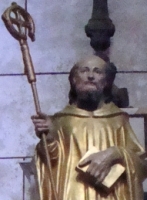
• Euticius
• Witiza
• the Second Benedict
Born a Visigoth, the son of Aigul, Count of Maguelone. Educated at the court of Pepin. Courtier and cup-bearer to King Pepin and Blessed Charlemagne. Part of the 773 campaign of Charlemagne. Narrowly escaped drowning in the Tesin near Pavia, Italy while trying to save his brother.
Benedictine monk at Saint Sequanus monastery where he took the name Benedict. Lived two and one half years on bread and water, sleeping on the bare ground, praying through the night, and going barefoot.
In the Frankish empire, monasticism suffered lay ownership and the attacks of the Vikings. Monastic discipline decayed. In 779 Benedict founded the Aniane monastery on his own land; the monks did manual labor, copied manuscripts, lived on bread and water except on Sundays and great feast days when they added wine or milk, if they received any in alms. The results of his austere rule were disappointing, so he adopted the Benedictine Rule, and the monastery grew. He then reformed and inaugurated other houses; Saint Ardo travelled with him and served as his secretary.
Bishop Felix of Urgel proposed that Christ was not the natural, but only the adoptive son of God (Adoptionism); Benedict opposed this heresy, wrote against it, and assisted in the Synod of Frankfurt in 794.
Emperor Louis the Pious built the abbey of Maurmunster as a model abbey for Benedict in Alsace, France, and then Cornelimunster near Aachen, Germany, then made Benedict director of all the monasteries in the empire. The monk instituted widespread reforms, though because of opposition they were not as drastic as he had wanted.
Participated in the synods in Aachen. Benedict was an advisor and supported of the emperor. Wrote the Capitulare monasticum, a systematization of the Benedictine Rule as the rule for all monks in the empire. Compiled the Codex regularum, a collection of all monastic regulations, and Concordia regularum, showing the resemblance of Benedict's rule to those of other monastic leaders. The rules stressed individual poverty and chastity with obedience to a properly constituted abbot, himself a monk. Benedict insisted upon the liturgical character of monastic life, including a daily Conventual Mass and additions to the Divine Office. He stressed the clerical element in monasticism which led to the development of teaching and writing as opposed to manual labor in the field. This direction lapsed some after Benedict's death, but had lasting effects on Western monasticism. Benedict is considered the restorer of Western monasticism and is often called "the second Benedict".
c.747 at Languedoc, France as Witiza
• 11 February 821 at Cornelimunster, Aachen, Germany of natural causes
• buried on 12 February 821
• Benedictine abbot with supernatural fire near him
• man in a cave with food being lowered to him in a basket
• man giving the habit to Saint William of Aquitaine
https://catholicsaints.info/saint-benedict-of-aniane/
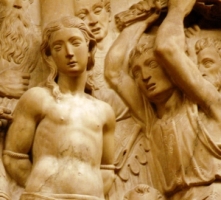
Aulaire, Aulazia, Aulazie, Auzalie, Elalia, Eulalie, Eulària, Occille, Olacie, Olaia, Olaille, Olaire, Olalla, Ollala
Sanctified virgin, the forerunner of professed nun. Martyred at age 13 or 14 in the persecutions of Diocletian. Often confused with Saint Eulalia of Merida. Several villages in Guienne and Languedoc are named for her.
c.290 in Barcelona, Spain
• 12 February 304 at Barcelona, Spain
• interred in the church of Santa Maria del Mar, Barcelona
• relics translated to the Barcelona cathedral on 23 November 874
633
• against drought
• against dysentery
• boatmen, mariners, sailors, watermen
• pregnant women
• for rain
• safe sailing
• safe seafaring
• travellers
• Barcelona, Spain
• Barcelona cathedral
• young woman with a palm and cross in her hand
• young woman with a lily and a book
Lord Jesus Christ, hear my prayer and perfect Thy merciful goodness in me, and grant me to be received among the number of Thine elect into the rest of life eternal, making of me a sign of righteousness that men believing on Thee may behold and praise Thy power. Amen. - Prayer of Saint Eulalia in Her Agony
https://catholicsaints.info/saint-eulalia-of-barcelona/
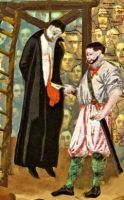
• 22 November as one of the Martyrs of England, Scotland, and Wales
• 29 October as one of the Martyrs of Douai
Youngest son of Evan and Helen Haydock. Educated at the English College in Douai, France, and the English College in Rome, Italy. Ordained on 21 December 1581 at Rheims, France. He then returned to England to minister to covert Catholics during the persecutions of Queen Elizabeth I. Arrested in London, England, he served 15 months in the Tower of London for the crime of being a priest; at one point he was finally allowed to administer the Sacraments to fellow prisoners. Zealous supporter of the pope, and not secular authorities, as ruler of the Church. Martyr.
c.1557 in Cottam Hall, Lancashire, England
hanged, drawn and quartered on 12 February 1584 in Tyburn, London, England
22 November 1987 by Pope John Paul II
I pray God that my blood may increase the Catholic faith in England. - Blessed George, speaking from the gallows
https://catholicsaints.info/blessed-george-haydock/
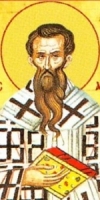
Meletios, Melezio
Born to a wealthy and prominent family. Bishop of Sebaste, Armenia (modern Sivas, Turkey) in 358 following the deposing of an Arian bishop. The Arian priests revolted, and forced Meletius into exile. Chosen bishop of Antioch, Syria after that city's Arian bishop had re-located to Constantinople. The Arians in the diocese revolted, and Meletius was exiled three times, returning in 362, 367 and 378. Supported by Saint Basil of Caesarea while in exile. In 379 he called a council at Antioch to formally install orthodox Nicene Christianity as the proper profession of the faith. Baptized and ordained Saint John Chrysostom; consecrated Saint Gregory of Nazianus as bishop of Constantinople in 381.
early 4th century Melitene, Lower Armenia (modern Malatya, Turkey)
• 381 at Constantinople (modern Istanbul, Turkey) of natural causes
• the funeral oration was delivered by Saint Gregory of Nyssa
• buried in Antioch beside Saint Babylas
https://catholicsaints.info/saint-meletius-of-antioch/
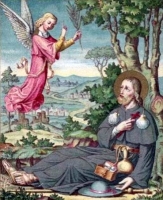
Ludano, Ludain, Luden
Born to the Scottish nobility, the son of Itiboldo. Used his inheritence to build a hospital for the poor, a hospice for pilgrims. Died while returning from pilgrimage to the tombs of the Apostles.
12th century Scotland
• 1202 in Nordheim, Alsace, France of natural causes
• while asleep under an elm tree, Ludan received a vision that he was about to die; he prayed to receive Holy Communion one more time; an angel then appeared with the Eucharist
• bells in local churches are reported to have spontaneously rang at the moment of his death
• two local parishes each wanted Ludan to rest at their church; an abbot settled the matter by having the body put in a cart, the cart yoked to a wild horse, and the horse turned loose; the horse stopped in front of the church of Saint George, and there Ludan was buried
• relics enshrined in Saint Ludan church in Nordheim
https://catholicsaints.info/blessed-ludan/
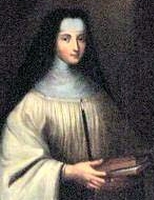
Hombeline, Homberga, Humbelina, Ombelina, Ombeline, Ombline
21 August in the Cistercian martyrology
Younger sister of Saint Bernard of Clairvaux. Married to Guy de Narcy, a member of the ruling family of Lorraine (in modern France). After a few years of rich and frivolous living, Humbeline turned her back on the worldly life; after a few more years she, with her husband's approval, became a Benedictine nun at Jully-les-Nonnains convent near Troyes, France. Served as abbess there.
1092 in Dijon, France
• 21 August 1136 at the Jully-les-Nonnains convent in France of natural causes
• several family members, include Saint Bernard were with her
• buried in Jully-les-Nonnains
1703 by Pope Clement XI (cultus confirmed)
against loss of parents
https://catholicsaints.info/blessed-humbeline-of-jully/
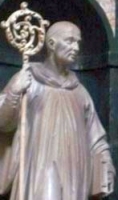
• Goscelinus of San Solutore
• Goslin, Goslino, Gozzelino, Gozzelinus
Born to the Italian nobility. Benedictine monk in 1006 at the San Solutore Abbey near Turin, Italy soon after its founding. Reluctant abbot in of the house in 1031, he served the remaining 22 years of his life.
• 12 February 1053 of natural causes
• relics enshrined in San Solutore Abbey in 1472
• the San Solutore Abbey was destroyed during the occupation of Italy by the French in 1536, and the relics were transferred Consolata Benedictine monastery
• relics enshrined in the church of Saints Solutore, Ottavio and Avventore in Turin, Italy on 19 January 1575
• relics transferred to the church's new constructed chapel of Saint Paul in 1584
https://catholicsaints.info/saint-goscelinus-of-turin/

• 29 October as one of the Martyrs of Douai
• 1 December as one of the Martyrs of Oxford University
Educated at Corpus Christi College and Gloucester Hall at Oxford University. Married layman and schoolmaster. Widower. He studied at Rheims, France, and was ordained in 1580. He returned to England to minister to covert Catholics in the area of Somerset. Arrested for his faith, he was convicted of treason when he remained loyal to Rome and refused to take the Oath of Supremacy. Martyr.
at Montacute, Somerset, England
hanged, drawn, and quartered on 12 February 1584 at Tyburn, London, England
15 December 1929 by Pope Pius XI
https://catholicsaints.info/blessed-james-fenn/
• Anthony Cauleas
• Antony Cauleas
• Antony Kauleas
• Antony II of Constantinople
Born to a noble family from Phrygia who had moved to the country to escape persecution by the iconoclasts. Monk near Constantinople at age 12. Abbot of his house. Patriarch of Constantinople in 893. He worked to heal the schisms created by his predecessor Photius, presiding over the Fourth Æcumenical Council of Constantinople in 869 and 870 which condemned or reversed all that Photius had done; all records of the council were destroyed by later schismatics. Throughout his life Antony was known for his personal holiness, his deep personal prayer life, and the sanctity he brought to his offices.
829 near Constantinople
12 February 901 of natural causes
https://catholicsaints.info/saint-anthony-kauleas/
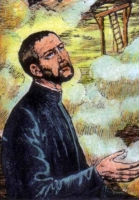
1 December as one of the Martyrs of Oxford University
Educated at Oxford, England. Convert to Catholicism. Seminarian at the English College in Rome, Italy; ordained in 1583. He returned to England to minister to covert Catholics during the persecutions of Queen Elizabeth I. Arrested and executed for the crime of being a priest. Martyr.
Stoke, Dorset, England
hanged, drawn and quartered on 12 February 1584 in Tyburn, London, England
15 December 1929 by Pope Pius XI
https://catholicsaints.info/blessed-thomas-hemeford/
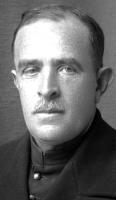
Studied at the Pontifical Seminary of Shkodrë, Albania. Ordained on 19 May 1915 as a priest of the archdiocese of Shkodrë-Pult, Albania. Imprisoned and tortured to death in the anti–Christian persecutions of the Albanian Communist government. Martyr.
8 August 1890 in Shkodrë, Albania
12 February 1949 in Shkodrë, Albania
• 5 November 2016 by Pope Francis
• beatification celebrated at the Square of the Cathedral of Shën Shtjefnit, Shkodër, Albania, presided by Cardinal Angelo Amato
https://catholicsaints.info/blessed-jak-bushati/
Aethelweald, Aedilauld, Ethilwald, Ethelwold
21 April (translation of relics)
Leather worker and bookbinder. Monk. Assistant to Saint Cuthbert of Lindisfarne. Prior and abbot of Old Melrose monastery in Scotland. Bishop at Lindisfarne in 721. Commissioned the famous Lindisfarne Book of Gospels, now in the British Museum, and made its jewel-encrusted leather cover, now lost. Wrote the Hymnal of Ethelwald.
at Northumbria, England
• c.740
• buried in the cathedral at Lindisfarne
• relics taken to Durham in the hope they would prevent Danish invasion
https://catholicsaints.info/saint-ethelwald-of-lindisfarne/
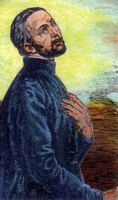
• 29 October as one of the Martyrs of Douai
• 1 December as one of the Martyrs of Oxford University
Studied at New College, Oxford. Teacher and schoolmaster. Studied for the priesthood at Rheims, France, and Rome, Italy. Ordained in 1582. Martyr.
at Coltley, South Maperton, Dorset, England
hanged, drawn, and quartered on 12 February 1584 at Tyburn, London, England
15 December 1929 by Pope Pius XI
https://catholicsaints.info/blessed-john-munden/

Joined the Augustinians as a young man. Feeling a need to devote himself to God, he wanted to "go where no one knew him except God alone", and he withdrew for a while to live as a hermit in prayer and penance in the province of Portugal. Missionary to the island of San Thomé, in the East Indies.
early 16th century in Barletta, Italy
13 May 1580 San Thomé, East India of natural causes
https://catholicsaints.info/blessed-paolo-of-barletta/
Benedictine monk of Santa Maria dei Fonti, Italy. Hermit on the island of Gallinaria in the Gulf of Genoa, Italy. Bishop of Albenga, Italy in 870.
• c.900
• buried at the church of Santa Maria de Fontibus
• relics enshrined in a chapel dedicated to him there in 1409
• following a collapse of the old church in 1614, the relics were enshrined in a new wooden reliquary
by Pope Gregory XVI (cultus confirmation)
https://catholicsaints.info/blessed-benedict-revelli/
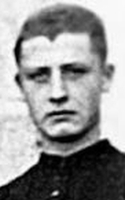
Seminarian of the archdiocese of Tarragona, Spain. Martyred in the Spanish Civil War.
31 March 1915 in Solivella, Tarragona, Spain
12 February 1937 in Sarral, Tarragona, Spain
• 13 October 2013 by Pope Francis
• beatification celebrated in Tarragona, Spain
https://catholicsaints.info/blessed-josep-gassol-montseny/
29 October as one of the Martyrs of Douai
Brother of Blessed Robert Nutter. Fellow at Saint John's College, Cambridge. Studied for the priesthood at the English College in Rheims, France. Ordained in 1581. Martyr.
at Burnley, Lancashire, England
hanged, drawn, and quartered on 12 February 1584 at Tyburn, London, England
15 December 1929 by Pope Pius XI
https://catholicsaints.info/blessed-john-nutter/
• Seadhal, Siadal, Siadhal
• the Christian Virgil
Wrote the epic poem Carmen Paschale. He left Ireland to found a school of poetry in Athens. May have been a disciple of Saint Ailbhe. In 494, a decree of the First Roman Council contained a phrase "honoring by signal praise the Paschal Work of the Venerable man, Sedulius".
Irish
https://catholicsaints.info/saint-sedulius/
• Alexius of Kiev
• Alexius of Moscow
Russian nobleman who gave up his worldly position to become a Basilian monk. Archbishop of Kiev. Well educated, but he was more known for his spiritual wisdom; even the Sultan of the Turks in Asia Minor sought his advice.
1364
https://catholicsaints.info/saint-alexis-of-kiev/
Benedictine monk at the abbey outside Gembloux, Belgium. Feeling a call to a more austere life, he joined the Cistercians at the monastery at Villers Abbey near Villiers-la-Villes, Belgium.
at Villers Abbey near Villiers-la-Villes, Belgium of natural causes
https://catholicsaints.info/blessed-nicolo-of-san-bernardo/
Franciscan friar. Betrayed by a heretic monk, he and several of his religious brothers were martyred by order of King Bazarath.
1369 at Vidin (in modern Bulgaria)
https://catholicsaints.info/blessed-ladislas-of-hungary/
Franciscan friar. Betrayed by a heretic monk, he and several of his religious brothers were martyred by order of King Bazarath.
1369 at Vidin (in modern Bulgaria)
https://catholicsaints.info/blessed-nicholas-of-hungary/
Franciscan friar. Betrayed by a heretic monk, he and several of his religious brothers were martyred by order of King Bazarath.
1369 at Vidin (in modern Bulgaria)
https://catholicsaints.info/blessed-gregory-of-traguio/
Deacon. Martyred in the persecutions of Diocletian.
Sardinia (part of modern Italy)
• c.304
• relics moved to Benevento, Italy c.785
https://catholicsaints.info/saint-modestus-the-deacon/
Franciscan friar. Betrayed by a heretic monk, he and several of his religious brothers were martyred by order of King Bazarath.
1369 at Vidin (in modern Bulgaria)
https://catholicsaints.info/blessed-anthony-of-saxony/
Franciscan friar. Betrayed by a heretic monk, he and several of his religious brothers were martyred by order of King Bazarath.
1369 at Vidin (in modern Bulgaria)
https://catholicsaints.info/blessed-thomas-of-foligno/
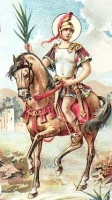
Soldier. Martyr.
in Africa, date unknown
https://catholicsaints.info/saint-damian-of-africa/
Martyr.
• in Rome, Italy, date unknown
• relics discovered in the catacombs of Saint Callistus, and sent to Spain
https://catholicsaints.info/saint-damian-of-rome/
Bishop of Verona, Italy.
• c.465
• relics in the basilica of Saint Stephen, Verona, Italy
https://catholicsaints.info/saint-gaudentius-of-verona/
Martyr.
160 at Alexandria, Egypt
https://catholicsaints.info/saint-julian-of-alexandria-12-february/
Child martyr.
https://catholicsaints.info/saint-ammonius-of-alexandria-12-february/
Martyr.
c.160 at Carthage
Cartagena, Spain
https://catholicsaints.info/saint-modestus/
Child martyr.
https://catholicsaints.info/saint-modestus-of-alexandria/
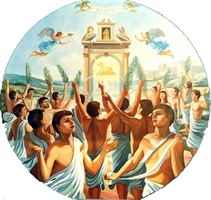
During the persecutions of Diocletian, troops were sent to the churches of Abitina, North Africa on a Sunday morning; they rounded up everyone who had arrived for Mass, and took them all to Carthage for interrogation by pro-consul Anulinus. The 46 who proclaimed their Christianity were executed. We know some of their names and stories
• Ampelius
• Cassiano
• Ceciliano
• Cecilia
• Danzio
• Deciano
• Emeritus
• Ercolina
• Eva
• Fausto
• Felice (2 by this name)
• Felix
• Gennara (2 by this name)
• Gennaro
• Giriale
• Hilarion
• Maggiore
• Margherita
• Martino
• Mary
• Massimiano
• Matrona (2 by this name)
• Onorata
• Pelusio
• Pomponia
• Prima
• Quinto
• Regiola
• Restituta
• Rogatian (3 by this name)
• Rogato (2 by this name)
• Saturninus the Elder
• Saturninus the Younger
• Seconda (2 by this name)
• Thelica
• Victoria
• Vincenzo
• Vittoriano
• Vittorino
tortured to death in 304 in prison at Albitina, North Africa
https://catholicsaints.info/martyrs-of-albitina/
• Our Lady of Argenteuil
• Our Lady of Iviron
CatholicSaints.Info Portable Edition